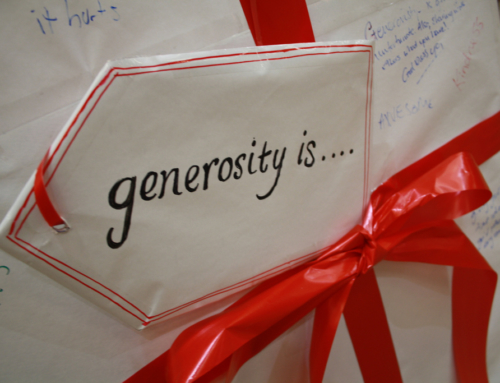January 23, 2015
By Eddie Pipkin
Every year, the week before Advent begins, I drive to the church storage unit with the Director of Children’s Ministry for the local congregation that she and I serve, and we load my ragged old Honda Odyssey right up to the roof with all of the Christmas decorations.
Then the week after Epiphany, it all goes back in the boxes and back in the van and back to the storage unit. And at that point, I am really, really done with anything related to taking decorations up and down. We get to the storage unit, which is a hodgepodge of old bits and pieces of ministry, file boxes, discarded furniture and out-of-date sound equipment, and it’s time to wedge the Christmas trees, wreath boxes, and the giant nativity back into that cramped and crowded space. Our packing of the items into containers has been a little haphazard and rushed, and boxes are partially taped, with fake evergreen branches and loose strings of lights hanging out. My partner in storage adventures (who is a highly organized and efficient person) says to me, “Don’t you want to take a few minutes and repack these boxes and rearrange some of these stacks of stuff so that it’s better organized and doesn’t fall over and kill somebody?”
And I, true to my nature, say, “Nah, I’ll come back and do that later sometime.”
So, in it goes—stacks more precarious than ever—tottering, leaning, and a nightmare for the next poor sap who rolls up that door.
On the drive home this year, it dawned on me what a spot-on metaphor this broken process is for ministry and the way we let things pile up, accumulate, get unorganized, and wobble on the brink of disaster because we don’t periodically take the time to clear up and clean out. We rush from emergency to emergency, from one deadline to the next, and we pile up the detritus of ministry work. We put things off that could be dealt with far more easily today than weeks or months from now. We don’t sort our email, we don’t throw out old paperwork, and we don’t write down notes for next time when things are freshest on our minds.
One of the smartest things we can do to avoid burnout is to be diligent about scheduling some time each day, week, and month just to reorganize (and/or organize). That is, a few minutes every day, a couple of hours every week, and a whole day once a month dedicated solely to clearing the decks and organizing physical space and ‘cloud space’ can give us a sense of closing chapters and forging ahead with direction. Another is to stop imagining that we are only cool if we are multi-tasking seven things at once. Increasingly, psychologists and behavioral scientists tell us that we are in fact not wired to do multiple things well simultaneously. Rather than doing seven things at once but with mediocre results, it’s important to sometimes have one thing to focus on to completion (with excellence).
And if we are delaying or stalling because the thing to be done is something that we hate doing (like arranging storage units), remember Mark Twain’s quote: “Eat a live frog first thing in the morning, and nothing worse will happen to you the rest of the day” (the foundational quote for Brian Tracy’s great book on battling procrastination, Eat That Frog!). Similarly, if we are stalling because we don’t want to make a difficult or unpleasant decision, remember the aphorism that “Anything that must be done eventually, should be done immediately.” Then get on with it!
Here are some ideas:
- If you routinely make notes when you are having conversations and participating in meetings (and you should) organize them and collate them periodically before you forget what the notes are referring to.
- Write thank-you notes immediately after the event for which they are expressing thanks (they completely lose their effectiveness if not sent promptly – and while a good, old-fashioned thank-you note still works magic, texting is nice, too, and immediate in nature.
- Be aggressive about deleting emails you don’t really need and sorting the ones you need to archive in an organized fashion.
- Make notes for an event immediately after its conclusion, then pass those notes on to other stakeholders and have them add their own comments. Use an online calendar app to send notes/reminders to your future self for the next time you organize this event.
- Throw stuff out! Particularly hard copies of things you rarely need that could be accessed electronically (don’t be afraid to digitally scan resources).
What are the things that you pile up? What clutter routinely clogs up your ministry? And what solutions have you found to avoiding these issues? Use the comments section to share your insights.







Leave A Comment